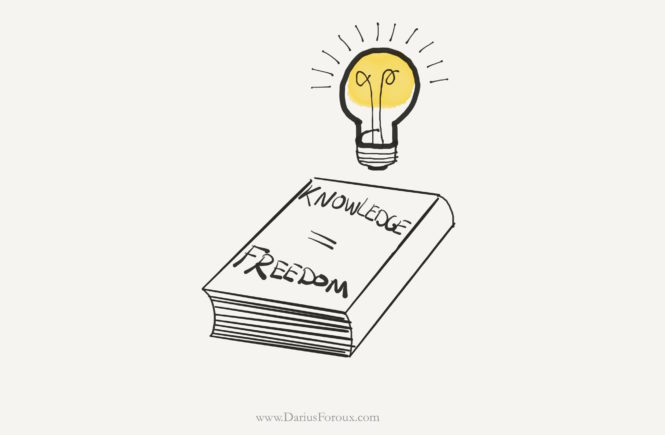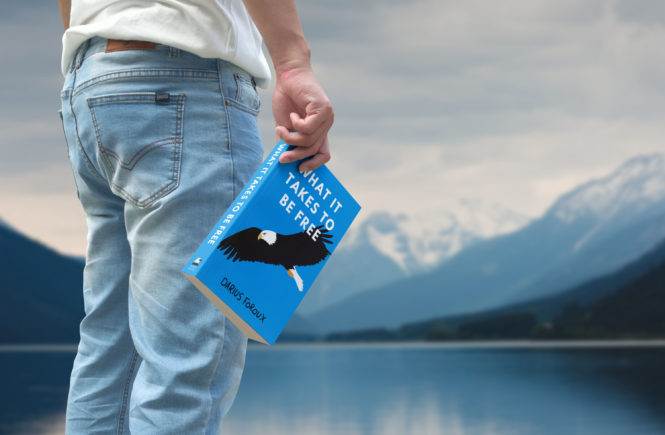Out of all the different ways to learn, books remain my favorite way to absorb knowledge. I especially like practical books with the knowledge that you can immediately apply to your life.
What I like about books is that I can read them by myself, in silence. It’s me and the author, one on one, having a conversation in my mind.
In the beginning of this year, I shared my system for reading 100 books a year. It was interesting to see how many people saw it as a challenge. But there were also many skeptics.
- Why would you read so much?
- This guy is full of shit.
- There’s no way I can do that.
Think about what you want. Reading changes people. And fortunately, many people in this world read a lot. That’s a good thing.
I strongly believe that reading, and educating yourself, is the answer to a better life. And ultimately, freedom. Nelson Mandela said it best:
“Education is the most powerful weapon which you can use to change the world.”
Out of all the books I’ve read, I have a small number of favorite books. I always keep them on my desk.
These are the books I refer to often — some books are timeless and get better as you study them. There’s a real difference between reading a book for the first time and reading it for the second time. And so forth.
Here are 5 books that I reread every year. And every year, they become better and more useful to me.
1. Managing Oneself by Peter Drucker
The best self-help piece that is ever written. It’s actually an article that appeared in the Harvard Business Review in 1999. And in 2008, it was published as a paperback.
I often talk about self-awareness. And Managing Oneself describes one of the best ways to become self-aware.
As you live your life, you tend to do things on autopilot. After you’ve done a job for years, you think you know everything about it. You stop growing. That’s why I like Managing Oneself. It gives us the tools to remain critical of ourselves.
Because, how can you be critical of others, if you can’t be critical of yourself? Managing Oneself is a constant reminder that the person who needs to be managed the most, is me.
I tend to read this book (or article, if you want), a few times a year. It depends on how much progress I see in my life. Whenever I stall, I grab Managing Oneself.
2. A Manual For Living by Epictetus
Another short book. And just as good. A Manual For Living is exactly what the title says it is.
This is also a book I read often. I think six or seven times a year. It is my go-to book for life advice.
I don’t agree with everything that Epictetus says, but for a piece that has been written 2000 years ago, it’s still extremely relevant.
Like Socrates, Epictetus also didn’t write. Instead; he had his own school where he taught his Stoic philosophy. A Manual For Living is actually transcribed by his pupil Arrian.
This book also gives you a larger perspective on humanity. People have always had problems with self-confidence, family, work, other people, etc. In a way, nothing has changed. And that’s pretty comforting.
Adopting a Stoic mindset can also prevent much of the unnecessary worry in our lives. This quote is the foundation of Epictetus’ teachings:
“That alone is in our power, which is our own work; and in this class are our opinions, impulses, desires, and aversions. What, on the contrary, is not in our power, are our bodies, possessions, glory, and power. Any delusion on this point leads to the greatest errors, misfortunes, and troubles, and to the slavery of the soul.”
3. Post Office by Charles Bukowski
“Hey, what’s that book doing here?” Well, I often talk about how I don’t take life seriously. And Bukowski is one of my main influences.
Intellectualists (who take themselves way too seriously), hate Bukowski. They say he was a bad writer. I don’t care.
His books are the funniest and most entertaining things that have ever been written. And the Post Office is my favorite. I crack up every time I read it.
It’s a novel, but as Bukowski said, it’s autobiographical. Post Office is about the years he was a substitute mail carrier in Los Angeles during the 50s and 60s. He wasted 12 years of his life at the post office.
Bukowski’s life was also interesting. He struggled for many years. And during one stretch of time in the 50s he could only afford two 5-cent candy bars a day. He was a real starving artist, but that didn’t do any good for his work. He wrote:
“A man could write much better after eating a porterhouse steak and drinking a pint of whiskey than he could ever write after eating a nickel candy bar. The myth of the starving artist was a hoax.”
His first novel wasn’t published until 1971 when he was 51. He had to wait a LONG time to become successful.
4. Feel The Fear And Do It Anyway by Susan Jeffers
Fear is something that holds us back on a daily basis. And Susan Jeffer’s book gives you practical tips on how you can manage fear.
I say ‘manage’ because fear is something that will never go away. And that’s why I like to read this book every year.
Fear is such a primal emotion that it’s easy to give into it. But if you do, that’s the end of you. I also like the title: Feel The Fear And Do It Anyway. Exactly — feel the fear, and do it anyway.
5. The Elements of Style by William Strunk and E.B. White
Have you ever received an email, message, report, and you didn’t understand the language? Or have you ever read a company’s website and you don’t have a clue what they do? Or how about reading articles that don’t make any sense?
Now—reverse the roles. You’ve probably written something that wasn’t clear. In fact, I believe that we all write unclearly at times. It’s a hard thing to do.
And every job has some form of written communication. So you don’t want to write in a way that people don’t understand.
That’s why The Elements of Style is such an important book. Especially now when most communication is written. And this book teaches you how to think and write clearly—so that people understand you. A valuable skill.
The Elements of Style is a must-read for everyone, not only journalists or writers.
There you go. Maybe you pick up one of the above books. Maybe you don’t. That’s not the point of this article.
I just hope you pick up a book you’ve read in the past and give it another read.
Great books are meant to be read, re-read, passed on, and read again. That’s the only way that true knowledge survives. By sharing it.
P.s. Other books that I reread often are: On The Shortness Of Life by Seneca, The War Of Art by Steven Pressfield, Mindset by Carol Dweck, Tribes by Seth Godin. I didn’t include them because I already talk about them a lot in my other articles or book recommendations.




